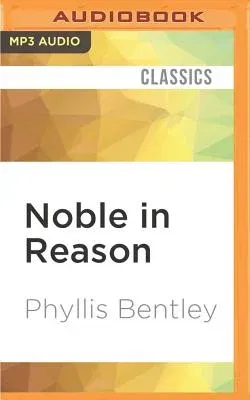Phyllis Bentley, a native of Halifax, has written many novels with a
background set in the West Riding of Yorkshire. Her descriptive power
has been compared to that of the Brontës, who lived but 12 miles from
Miss Bentley's home. Of her stories "The House of Moreys" is perhaps
best known, and in the same blunt, homely, Yorkshire tradition comes her
novel Noble in Reason.
So intimately written that it appears to be an autobiography, it tells
the story of Christopher Jarmayne, a delicate, sensitive lad who suffers
a great deal from continued friction with the robust Yorkshire family
into which he was born. Filled with self-pity and resentment, he spends
an unhappy life until he realizes, in a moment of illumination, that he
is as tiresome to them as they are to him. In the light of this
revelation he tells the strange and poignant story of his life and, with
the wisdom gained from experience, he makes it a dramatic and
fascinating story of unusual power.
Phyllis Bentley (1894-1977) published her first work in 1918, a
collection of short stories entitled The World's Bane, after which she
published several poor-selling novels. The publication in March 1932 of
her best-known work, Inheritance, set against the background of the
development of the textile industry in the West Riding, received
widespread critical acclaim and ran through 23 impressions by 1946,
making her the first successful English regional novelist since Thomas
Hardy and his Wessex. In 1949 she was awarded an honorary DLitt from
Leeds University; in 1958 she became a Fellow of the Royal Society of
Literature; and in 1970 was awarded an OBE.

